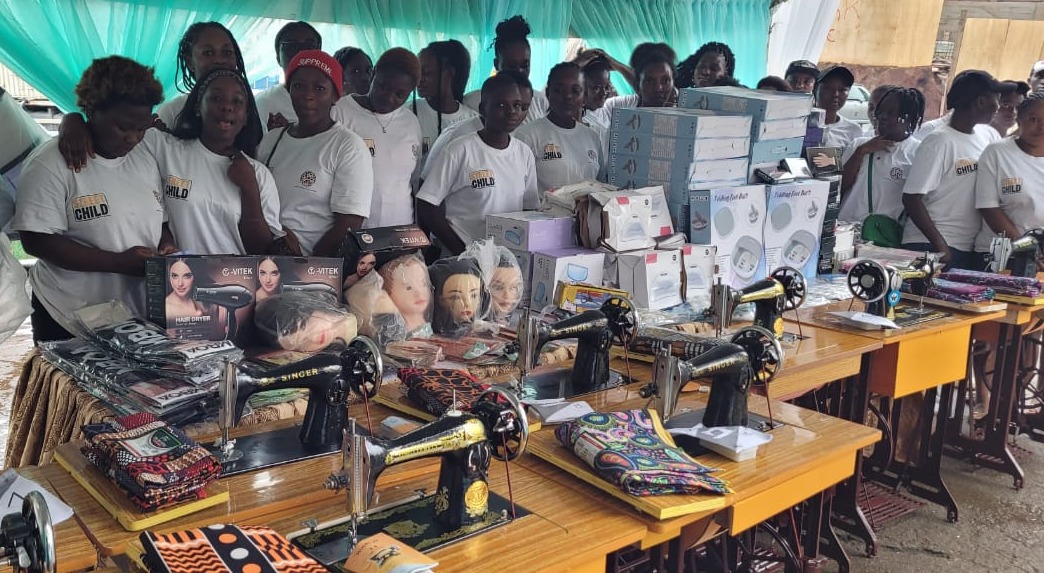From Crisis to Confidence
200 Displaced Girls in Cameroon Build New Futures
In the conflict-affected region of North-West / South-West Cameroon, hundreds of adolescent girls have faced years of disruption and are displaced, associated with armed groups, out of school and at risk of early marriage and exploitation. But through Street Child’s Girls’ Resilience and Empowerment Project (GREP), funded by the Dorothea Haus Ross Foundation, 200 young women have rewritten their own stories and have taken themselves from crisis to confidence, and from learning to earning.
Over 12 transformative months these young women participated in a Technical and Vocational Education and Training course that Street Child combined with life skills and confidence-building, foundational literacy and numeracy consolidation and menstrual health support, designed to strengthen both their independence and their resilience. The program, delivered in partnership with community trainers and mentors, offered practical pathways to self-sufficiency, and the results have been extraordinary.
200 Businesses Launched. 200 Futures Reimagined.
All 200 participants completed 20 weeks of Technical and Vocational Education and Training (TVET) in trades such as hairdressing, tailoring, computer literacy and mani-pedis, and all 200 young women launched a small business or entered employment.
185 girls are now self-employed entrepreneurs.
15 graduates secured paid positions in local salons, offices and spas or with tailors.
70% began earning income within just four weeks of graduation.
100% remained in school throughout the program (this was a condition of participation) and completed their education requirements.
For girls like Sandrine, who opened her own salon within two months of finishing training, the change has been life-defining. 'I never imagined I could be a business owner,' she said. 'Now I’m earning enough to help my family — and I’ve even hired two other girls from my community.'
Education and Empowerment Hand in Hand
A key requirement of the program was school attendance, and every single participant stayed enrolled. Sixty girls who were not literate or numerate at the start of the project gained foundational literacy by the end, while 100% of those sitting national examinations passed. Forty girls have since re-enrolled for another year of study while running their own microbusinesses on the side, with the support of their parents. And menstrual hygiene kits provided as part of the program eliminated absenteeism linked to menstruation, ensuring that girls could attend school confidently and consistently.
From Learners to Leaders
Several GREP graduates have taken their empowerment a step further, joining UNICEF’s 'Girls’ Vision for the Future' Movement to advocate for girls’ rights and education. They now lead awareness sessions on menstrual hygiene and gender equality, speaking at events alongside regional officials. Their voices, once unheard, are now helping shape the future for girls across Cameroon.
Why It Worked
The program’s success stems from the fact that all parts of the community, and all stakeholders, were fully engaged with the program. Caregivers, girls and other community members were extremely excited by the program (we had more than 2,000 applicants), we recruited local trainers and the girls were inspired by mentorship from female entrepreneurs from the community and surrounding areas. It became a truly community-driven effort, with parents, teachers and government leaders championing the girls’ participation and progress.
Lasting Impact
Beyond income and education, the project fostered leadership skills, long-term resilience including the confidence and rights knowledge to resist harm, and strong peer support: the girls have already come together into peer networks to support each other and mentor other women in their communities. And the community, with the support of local leaders, has expressed great interest in expanding the program to reach more girls and to include boys.
Street Child’s Cameroon Country Director Alfonce Tata Nfor, summed it up:
'This program proved what’s possible when a community stands behind its girls. They’re not just learning trades — they’re leading change.'
Thanks to the Dorothea Haus Ross Foundation, GREP has become one of Street Child’s most successful programs to date, and a blueprint for empowering girls to build brighter, more resilient futures.
